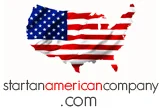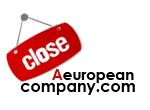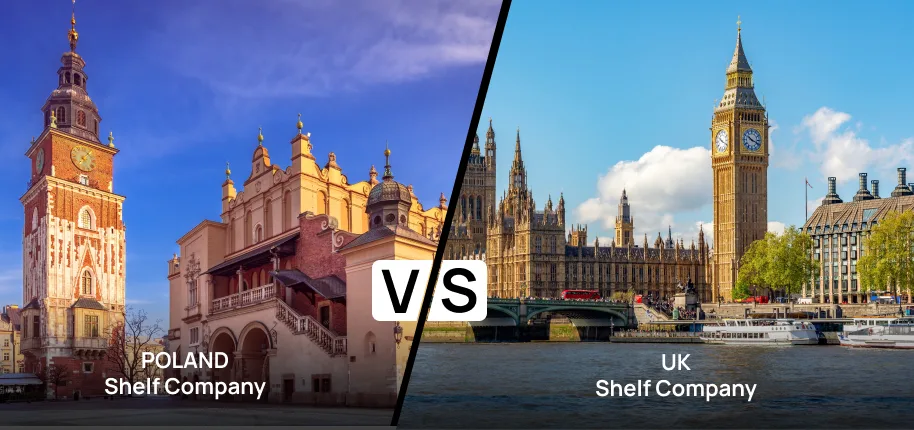The shelf company market across Europe has seen a surge in interest from entrepreneurs, global investors, and expanding SMEs. With growing demand for faster company incorporation and simplified administrative processes, shelf companies offer a strategic shortcut to business launch. Two of the most prominent jurisdictions in this space are Poland and the UK. For business owners evaluating their options, setup time and credibility are two of the most important decision-making factors.
A company that can be transferred quickly and carries substantial reputation value often makes all the difference when bidding for contracts, opening bank accounts, or registering for tax. This guide offers a detailed comparison of Poland vs UK shelf company, helping you choose the best jurisdiction for your needs based on speed, structure, legal framework, banking ease, and business reputation.
What Is a Shelf Company?
A shelf company, also known as an aged or ready-made company, is a business entity that has been pre-registered but remains dormant until sold to a buyer. It exists on paper, with no trading activity or assets, but comes with an official incorporation date and registration number. The main advantage of buying a shelf company is saving time. Instead of waiting weeks for documents and regulatory approvals, the buyer gets a ready-to-use business.
This model is ideal for entrepreneurs needing instant credibility for contracts, tenders, or foreign expansion. Shelf companies are also commonly used to expedite banking or tax registrations, particularly when age and a clean history are required. Whether you’re launching in London or Warsaw, shelf companies can fast-track your entry into the market, but only if you choose the proper jurisdiction.
Legal Framework Overview – UK vs Poland
When evaluating a Polish vs UK shelf company, it’s essential to understand the legal and administrative frameworks in each country. In the UK, company registration is handled by Companies House, a transparent and highly digitalised system that allows for quick incorporation and real-time updates. Most submissions can be made online, and data is publicly accessible, which adds to credibility and ease of compliance.
Poland’s equivalent is the Krajowy Rejestr Sądowy (KRS), or the National Court Register. While it ensures strong legal protection, its process is more bureaucratic. The court must often approve changes to company information, and some filings require notarisation or in-person submission. Moreover, language barriers and legal translations are usually necessary for non-Polish speakers, making the process slower and more complex. Understanding these legal bodies and their differences is critical when choosing where to purchase a shelf company.
Setup Time Comparison
Speed of setup is one of the biggest reasons people opt for shelf companies. Here’s how Poland vs UK shelf company options compare:
UK Shelf Companies
Transferring ownership of a UK shelf company is highly efficient. In most cases, it takes 24 to 48 hours. Updates to directors, shareholders, and registered addresses can be submitted electronically via Companies House. Many service providers offer fully digital solutions, meaning there’s no need for physical paperwork or in-person meetings.
Polish Shelf Companies
In Poland, setup time is notably longer. Ownership transfers require updates to the KRS, which involves court approval. The entire process can take 7 to 14 business days, and that’s assuming all paperwork is in order. Notary services, translations, and physical filings can introduce further delays, especially for foreign buyers unfamiliar with Polish procedures.
Company Credibility & Perception
Credibility is not just about paperwork; it’s about how banks, clients, and investors perceive your company. In this respect, both UK and Polish shelf companies offer strengths, but for different reasons. The UK enjoys a global reputation for being business-friendly, transparent, and legally sound. Its long-standing history as a commercial hub lends extra weight to UK-incorporated entities. For this reason, UK shelf companies are often preferred when targeting international clients or contracts in Commonwealth countries and English-speaking markets.
Poland, while newer to the global business scene, is steadily building its credibility. As a full member of the European Union, a Polish company offers unrestricted access to the EU market, something UK companies lost after Brexit. This makes Polish shelf companies a compelling option for those wanting an EU footprint with a legitimate, centrally located entity.
Tax Registration and Compliance Timelines
Tax registration is another critical factor in comparing Poland vs the UK shelf company structures. Here’s what buyers should expect:
UK
After purchasing a UK shelf company, buyers typically apply for a Unique Taxpayer Reference (UTR) and register for VAT if needed. These processes are relatively simple, often completed in a few days to a couple of weeks. HMRC’s digital systems make it easy to track and submit applications.
Poland
In contrast, Polish VAT registration is more stringent. It may require a security deposit, proof of business activity, and a detailed explanation of your operations. You must also register with ZUS (Social Insurance Institution) if employing staff. These steps can take several weeks and require precise documentation. While the process ensures regulatory safety, it’s not ideal for businesses in a hurry.
Bank Account Opening Efficiency
Opening a business bank account is often more difficult than forming the company itself, especially for foreign buyers.
UK
Thanks to a competitive banking environment, the UK offers a range of options, including challenger banks, digital-only platforms, and traditional high-street banks. While most still require KYC and identity verification, the process is relatively smooth. Many providers accept remote verification or video calls, which accelerates the onboarding time.
Poland
In Poland, banking procedures are much stricter. Most banks require in-person visits, original notarised documents, and Polish-speaking representatives. This can be a significant barrier for international buyers, particularly if not supported by a consultant. Without a local presence, getting a bank account may take weeks or even months.
Language & Documentation Challenges
The ease of doing business often comes down to how accessible the documentation and procedures are. In the UK, all company documents are in English, and the Companies House interface is user-friendly and digital. This lowers barriers and eliminates the need for translation or legal representatives in most cases.
In Poland, all legal documentation is produced in Polish. Foreign buyers must translate documents and often require certified translations or legalised versions to proceed with filings. This adds cost and time, making working with local advisors almost essential.
Costs – Direct & Hidden
A common oversight when comparing shelf companies is the total cost of acquisition and operation. Here’s how the two countries differ
| Cost Factor | UK Shelf Company | Polish Shelf Company |
| Purchase Price | Moderate | Slightly Lower |
| Post-Sale Updates | Low (Digital updates via Companies House) | Moderate to High (Court and notary fees) |
| Legal Translation Costs | None | Often Required |
| VAT Registration Costs | Free to Low | May require deposits or legal fees |
| Long-Term Admin Costs | Low | Moderate |
While Polish shelf companies may seem cheaper at first, the indirect costs of translation, court procedures, and legal representation can make them more expensive in the long run.
Flexibility in Customisation
Another key aspect of shelf company usability is how easily it can be tailored post-purchase. The UK excels in this area. Changes to directors, shareholders, the company name, and the registered address can be made almost instantly. You have significant flexibility to adjust the structure to suit your business model.
Polish shelf companies, on the other hand, are more rigid. Updates must be court-approved and sometimes notarised. While not impossible, these processes delay customisation and increase administrative burdens.
How We Help at RMC?
We help you navigate the complexities of choosing between a Poland vs UK shelf company. Our curated inventory includes:
- Vetted UK and Polish shelf companies
- Complete documentation and compliance checks
- VAT, ZUS, and UTR registration assistance
- Customisation services (director/shareholder changes, nominee services)
- Legal translation and Polish court submission support
We also offer free consultations to match you with the best jurisdiction based on your business goals, timeline, and target markets.
Conclusion
When weighing up a Poland vs UK shelf company, the right choice depends on your priorities. If you need a fast, flexible, and globally respected company structure, the UK is often the better option. However, if your strategy involves tapping into the EU market with a strong legal presence, Poland may provide a long-term advantage despite its slower setup.
Both jurisdictions offer unique benefits, but they come with distinct challenges in terms of language, cost, and bureaucracy. By understanding these differences and working with an expert provider, you can avoid delays, reduce costs, and launch with confidence. Ready to take the next step? Get in touch today to secure your UK or Polish shelf company with full support from the RMC team.




